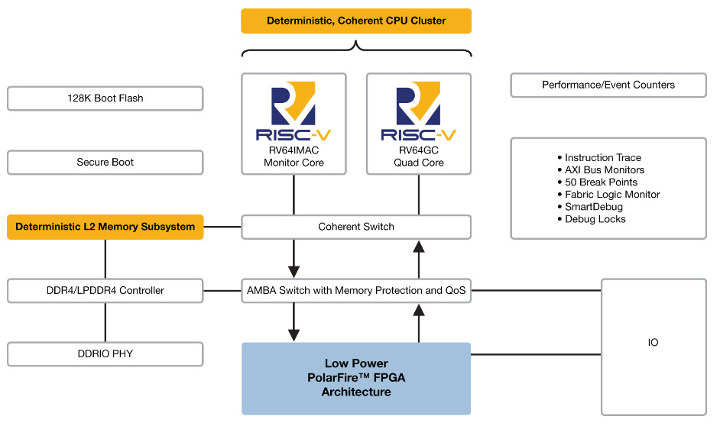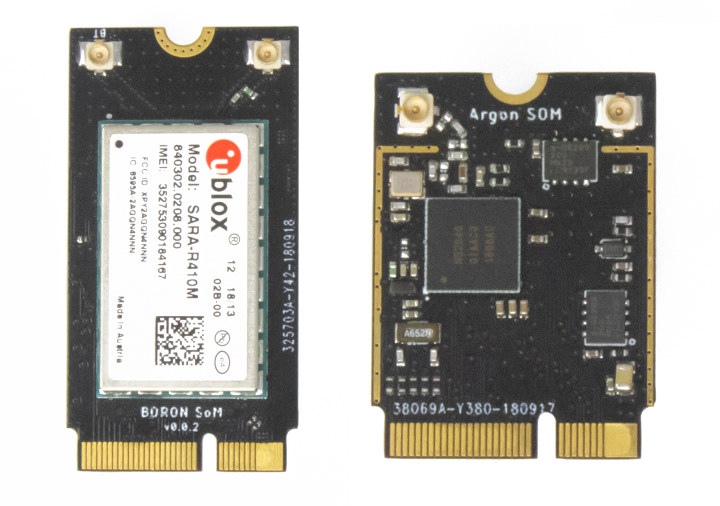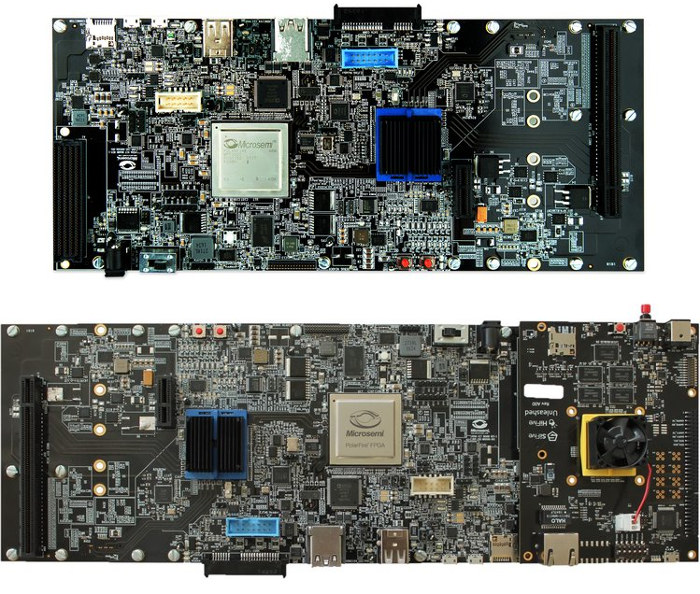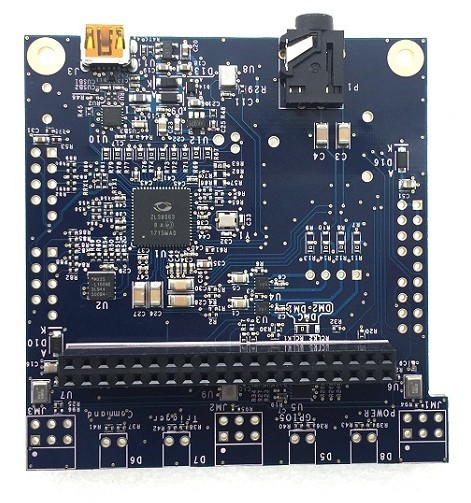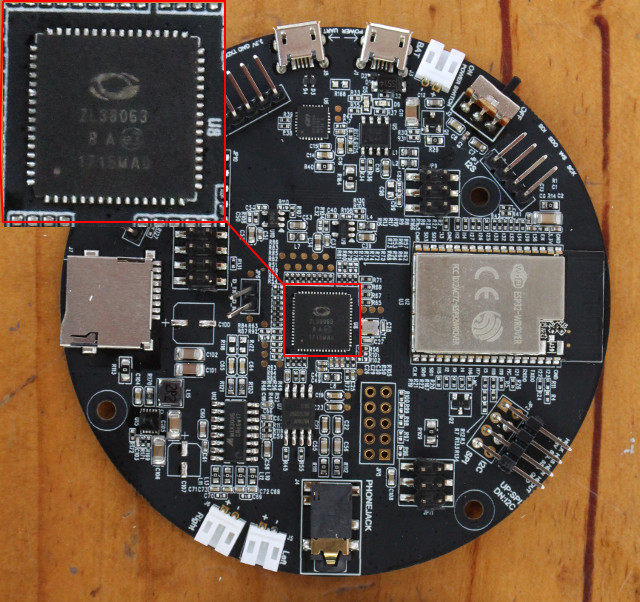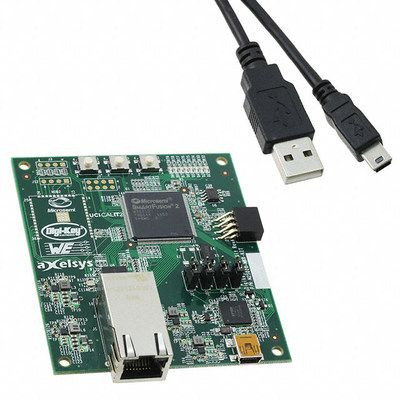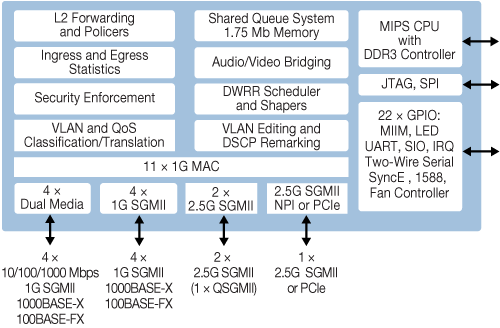In the past we’ve covered SoCs comprised of Arm cores and FPGA fabric via Xilinx Zynq-7000 series SoCs and Zynq UltraScale+ series MPSoCs, respectively featuring up to two Arm Cortex A9 cores, and up to four Cortex A53 cores. MicroSemi has now announced an alternative, not based on Arm cores, but instead based on SiFive U54-MC RISC-V cores combined with PolarFire FPGA fabric. PolarFire FPGA RISC-V SoC key features & specifications: FPGA – Microsemi PolarFire FPGA Processor Cores – Up to 4x SiFive U54-MC RISC-V cores clocked at up to 1.5GHz (performance similar to Cortex-A35 cores); 28nm process Deterministic Coherent Multi-core CPU Cluster Deterministic L2 Memory Subsystem System Memory I/F – Integrated DDR4/LPDDR4 Controller and PHY Storage – Secure Boot, 128K Boot Flash Debug capability Rich I/Os Low Power – Low static power; power optimized transceivers, up to 50% lower power compared to SRAM based FPGAs So we don’t have […]
Particle Unveils Mesh SoMs and IoT Developer Tools
Earlier this year, Particle unveiled three IoT development boards based on nRF52840 Bluetooth 5/802.15.4 WiSoC and supporting Particle Mesh, which interestingly is not based on Bluetooth Mesh or even Bluetooth, and instead relies on Thread specification/OpenThread implementation, and the 802.15.4 radio of the chip with Bluetooth only used for the initial setup stage. Particle announced the shipping date (October 2018 or… this month) for their Mesh boards pre-ordered in February, as well as three new products in a recent blog post. One of the products is a family of system-on-modules compatible with Particle Mesh, while the other two are related IoT developer tools. Particle Mesh SOMs The Particle Mesh SOMs will have similar names and features as corresponding Particle mesh developers kits such as Boron (NB-IoT / eMTC + BLE + Mesh) and Argon (ESP32 WiFi, BLE + Mesh), but with an edge connector and designed as enterprise-grade, production-scale version […]
HiFive Unleashed RISC-V Linux Development Board Gets a $2000 FPGA Expansion Board
If you’re a RISC-V architecture’s enthusiast or represent a company working on products with the new ISA, you may have spent $999 or more on Hifive Unleashed RISC-V Linux development board a few months ago. You now have the opportunity to spend an extra $1,999 for HiFive Unleashed Expansion Board powered by a MicroSemi PolarFire FPGA programmed with a PCIe root port bridge, and allowing you to test all sorts of peripherals such as HDD’s & SSD’s, HDMI output, and audio cards, network adapters, graphics cards, and so on. Expansion board specifications: FPGA – Microsemi Low Power PolarFire FPGA with 300K Logic Element 4 Gbit DDR4 x16 SPI Flash for remote FPGA updates, QSPI Flash connected to GPIO 24 lane PCIe Switch x1 PCI Express card connector x16 PCI Express card connector with 4 lanes of PCIe gen2 connected SSD M.2 connector SATA connector HDMI connector eMMC Nand Flash uSD […]
Banana Pi BPI-AI-Voice is a $169 Speech Recognition Development Kit based on MicroSemi ZL38063
SinoVoIP has just launched BPI-AI-Voice development platform for speech recognition on Aliexpress for $169, and excluding the different PCB color, it is a clone of the official $299 Microsemi AcuEdge Development Kit for Amazon AVS, which is based on MicroSemi ZL38063 audio processor and comes with two microphones. BPI-AI-Voice key features: Audio Processor – MicroSemi ZL38063 Storage – U2 SPI flash to store ZL38063 firmware Audio 4x on-board digital microphones (AKU441) supporting a 2 microphone configuration for 180° and 360° audio pick-up. 2x low cost class D audio amplifier (NCP2820) Expansion Headers JMMA1 audio header for digital microphone, analog out, and 3 GPIOs JM1-4 digital microphone headers for off-board microphones 40-pin P2 header to connected to Raspberry Pi 3 (I2S, SPI and 8x GPIO used) Debugging – JAIB2/2 auto tuning headers, micro USB port. Power Supply – 5V via micro USB port Dimensions – 70 mm × 66 mm Temperature […]
A First Look at ESP32-LyraTD-MSC Audio Mic HDK with Baidu DuerOS Assistant
Earlier this year, Espressif Systems had unveiled their ESP32-LyraTD-MSC Audio MiC HDK (Hardware Development Kit) which features an ESP32-WROOM module, a 4-mic array DSP, 3 microphones, an audio jack, and various I/Os. I received the board a couple of weeks ago, and while there’s no public information released yet, the company provided me with ESP32-LyraTD-MSC User Guide in English. Eventually, I’d expect Google Assistant and Amazon Alexa to be supported, but in the meantime I had to leverage my (lowly) Chinese language skills to get started since the kit is pre-loaded with firmware connecting to Baidu DuerOS voice assistant. ESP32-LyraTD-MSC Unboxing The kit came in a bland Espressif Systems carton box. Inside the package, I could only find one kit comprised of two boards. The bottom board read ESP32_MicrosemiDSP_Mainboard-V1, and does not show much apart from marking for connectors, headers and the power switch. While the top comes with eight […]
MicroSemi ZL38063 Audio Processor is Designed for Microphone Arrays
I’ve already been experimenting with DIY smart speakers and corresponding services for example using ReSpeaker board with Microsoft Bing Speech API, or Orange Pi Zero with Google Assistant SDK. But so far all the hardware platforms I used only came with one microphone, no microphone array that help with wake word detection in noisy environments. Last week-end, I received Espressif Audio Mic HDK, an ESP32 board with a 3-microphone array which I’ll review a in a few weeks once documentation becomes available and I clear some other items in my review list. In the meantime, I checked out the hardware, and found out the mainboard also comes with Microsemi ZL38063 audio processor specifically designed for microphone array. The chip was released las year, and can be already found in the company’s AcuEdge Development Kit for Amazon AVS, but since I’m going to use a board based on ZL38063 I’d thought […]
$34 SmartFusion2 Maker Board Arm Cortex-M3 + FPGA Board Supports ESP32 & ESP8266 Modules
Xilinx Zynq SoCs are probably the most well-known FPGAs with ARM cores, as their Cortex A9/A53 cores can run Linux, but they are not the only ones. Microsemi launched SmartFusion2 SoC comprised of FPGA fabric and an Arm Cortex-M3 core in 2013, as well as a $300 development kit. The company has now partnered with Digikey to launch SmartFusion2 Maker Board, a low-cost evaluation platform for the SoC that comes with Gigabit Ethernet, a USB port, a connector for ESP8266 module, PCB footprint for ESP32 module, among other features like a light sensor, LEDs, and buttons. SmartFusion2 maker board (M2S010-MKR-KIT) main features & specifications: SoC – Microsemi SmartFusion2 M2S010 SoC with: Arm Cortex-M3 @ 166 MHz, 6oKB+80KB eSRAM, 256KB eNVM FPGA with 12,084 logic element, 400 Kbits RAM Storage – 16 Mbit SPI Flash Connectivity Gigabit Ethernet via VSC8541 PHY, RJ45 connector Connector for ESP8266 (Sparkfun WRL-13678 – not included) […]
Microsemi VSC7513 and VSC7514 MIPS SoCs for Ethernet Switches Get Initial Mainline Linux Support
Microsemi VSC7514 is a 10-port Gigabit Ethernet (GbE)/SMB switch supporting a combination of 1G and 2.5G Ethernet ports, and VSC7513 comes with basically the same features except it’s limited 8 ports. Both SoCs include a MIPS processor with DDR3 memory interface, and support industrial and enterprise Ethernet switching features such as VLAN and QoS processing. Microsemi VSC751x Ocelot family was unveiled in June 2016, but I only heard about them today, as Free Electrons recently added initial support for VSC7513 & VSC7514 chip into mainline Linux with the patch series available here. Microsemi VSC7514 specifications & features: CPU / Memory Interface – Integrated 500 MHz MIPS 24KEc CPU with MMU and DDR3/DDR3L SDRAM controller Ethernet Connectivity – 4x dual media copper ports, 2x 1G SGMII ports, and 2x 1G/2.5G SGMII ports Host CPU Interfaces – PCIe 1.x and NPI CPU interface Internal shared memory buffer (8 queues per port) Jumbo […]


